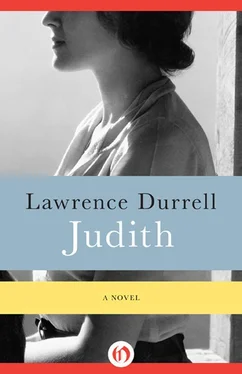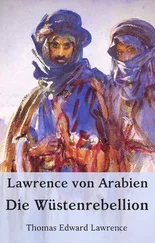It was long after midnight when they walked arm in arm across Jerusalem through the deserted streets. The fireworks had stopped now, but great clouds of red smoke still hung in the night sky, while a late thin moon cast its frail light across the domes and minarets of the city. The only noises from the Arab quarter were the withering snarls and yelps of the Arab radio, calling for death to the Jews and vowing vengeance on all who helped them.
At the end of the long line of cypresses, Lawton stopped suddenly.
“I’m going no further,” he said. “Goodbye, Grete.”
They looked at each other for a long moment, then impetuously, youthfully she embraced him… so quickly indeed that he had hardly time to respond.
“We shall meet again,” she said.
And in some strange way both of them believed that this was the truth — that this parting was not a final one. She turned and walked on down the long street towards her house, while he stood and watched her until she reached the safety of her front door. Then he sighed and turned about, lighting a cigarette as he walked slowly and thoughtfully homeward. There would not be much sleep for him tonight. Already the eastern sky was beginning to pale.
Later, sitting in the awkward bucket seats of the Dakota as it circled Lydda before heading eastward into the rising sun, Lawton looked out upon the city as if upon a relief map, tracing every feature of it from memory. He was surprised to find that he had fallen in love not only with Grete but with Jerusalem itself.
Lawton’s departure weighed heavily upon Grete, though she did not feel its impact until the day when she found a successor occupying his desk. It was something more than a blow to her social life. It was as if it had set in motion a train of other events which were now going to alter the whole circumstances of her life in the city. The office, for example, was closing. Its technical personnel were being transferred to England, while all the local staff, including Grete, were faced with a month’s notice and the gratuity of six months’ pay.
The political tension was mounting daily, too, and public disorders had now come to mark their everyday lives — the Jews fighting the Arabs, the Arabs fighting the Jews, while the unfortunate police attempted, without any success, to hold the ring. It became dangerous to walk in the streets. Shootings, burnings and lootings became the order of the day. The occupiers of Palestine, relieved at last of the burden they found so onerous, owing to their inability to tell the truth to either of the chief factions, or to honour the pledges given to both, now became almost deliberately slack in the execution of their duties.
The general attitude was well voiced by Duff when he exclaimed to a visiting rabbi, who had come to complain about lack of protection of property and person in the Jewish sectors of the town:
“You wanted us out, old chap. And you’re going to have us out.”
Peace had become a precarious matter, public safety in the life of the open street a question of sheer hazard; all day long the columns of motorized troops poured down the dust-choked roads towards the harbours. All night now one heard the crash of grenades in the narrow streets around the Jaffa Gate, or the rapid breathless stammer of pistols. By the time the police patrols had reached the spot, even the sound of running feet had died away, and only the victim of the attack lay there on the pavement, crumpled and silent. More often than not he or she proved to be an innocent victim of terrorism, someone belonging to neither side. Night-curfews came down like a lid upon their lives; all the innocent pleasures, such as dining out, dancing, going for midnight swims, became part of the pattern of their loss.
Such restraints sowed resentment in everyone. It was obvious that the British were packing up and pulling out, yet no official announcement to this effect was made, and this increased the fear and uncertainty. One day they would awake to find Palestine evacuated, left defenceless, and with no armed soldier on hand to prevent the entry of the Arab armies which surrounded this pathetic strip of coastal land. It seemed as if all the gloomy predictions of the Haganah Jews were to be fulfilled.
As for Grete, it was a period of indecision and depression. Her life in Jerusalem was coming to an end, and as yet she could form no coherent plan for the future. Once or twice she thought of returning to Ras Shamir, but a sense of shyness, of inhibition, seemed to paralyze her.
It was in one of these moods of dejection that she set out one day for the monastery by the Mount of Olives where Father Gaudier lived and worked. She had some difficulty in running him to earth, but at last succeeded in penetrating to the walled garden where he was busy pruning an apricot tree. He looked down from the ladder with his uncertain smile, wiping his hands in his soutane, and mopping a sweaty forehead with his sleeve.
“I expected you,” he said, somewhat surprisingly. “I don’t know why, but I did.”
Grete held the ladder while the little man climbed down.
“I suddenly felt the need to talk to you,” she said.
The priest nodded and said, “Come.” She followed him down the pathway with an expression of puzzlement on her face.
“It seemed to me,” she said, “that you alone knew all about me — you knew almost more about me indeed than I myself know. Therefore, I might consult you with profit. I’m at a loss about myself. I don’t know what to do, where to go, or whom to love.”
Father Gaudier did not appear to be listening. He hummed under his breath as he led the way to a small study which he unlocked with a key.
“Well now,” he said, “sit down and I’ll make you some sage tea.”
Grete sat with her hands in her lap and gazed into the blue eyes of the little man.
“I am glad you are not surprised to see me here, though it was only yesterday I suddenly remembered you. But I have been feeling recently that I needed to talk to someone — to talk about the whole of my life to someone, in order somehow to get back my will to live. I wanted, needed, to re-articulate my past life, so that perhaps I could see in it some sort of pattern which would allow me to make a decision, to plan for the future — for clearly I must soon decide, from a practical point of view, what I should do. I have considered every choice without any result — even the more drastic choices…
Father Gaudier turned off the kettle and poured out the boiling water into the little tisane cups. “The most extreme would be suicide I suppose, or entering a convent. I somehow don’t see either of them as being suitable for you.”
She laughed with relief. “You seem to know everything about me.”
“No,” he said. “It is just that you are like everyone else. It is pardonable to feel one is original, but you know that in moments of stress or loneliness most human beings react in the same way. I know much, of course — all that your husband had to tell me; but there are also gaps. Some I have filled in with the help of a mutual friend. Miss Peterson of Ras Shamir.”
“You know her?” she said with surprise.
“I consulted her about you — before,” he said.
“What did she have to tell you?”
“About your experiences in the camps and elsewhere. To me, it seemed most comprehensible that you should still feel the grave shock of all those horrors. That alone would be enough to make you unstable, afraid of yourself. If one is bound in this way by a feeling of guilt, it is practically impossible to make deliberate choices; one tries to force reality, and one pays for it with the wrong decision. That is why I always tell people to wait until reality refines itself down and leaves only a single way out.”
Читать дальше












